Hello, I would like to discuss a matter regarding my father-in-law's fixed deposit (FD) of 50 lakhs. I am the nominee as the daughter-in-law, even though he has three sons. He chose me as the nominee because I take care of him. My husband is well aware of this situation. My father-in-law has created a will but has not mentioned in the FD. He has already gifted his elder son a floor worth 1.5 crores. We are the youngest in the family. Verbal communication suggests that the FD belongs to me. My concern is whether my brother-in-law can claim the FD after my father-in-law's passing.
Ans: I understand the complexity and sensitivity of your situation. It's good that you are thinking ahead and seeking clarity. Let's discuss the nuances of this issue from a legal and financial perspective, ensuring you have a clear understanding of what may happen and how you can prepare.
Understanding Nominee Rights in Fixed Deposits
Firstly, let's understand the role of a nominee in a fixed deposit. A nominee is the person appointed to receive the funds in the event of the account holder's demise. However, being a nominee doesn't mean you own the funds outright. Legally, you act as a trustee or caretaker of the funds for the legal heirs.
Legal Rights and Heirship
The legal heirs have a right to claim the assets of the deceased as per the inheritance laws applicable. In the absence of a clear mention in the will about the fixed deposit, your father-in-law's estate, including the FD, would typically be distributed according to the laws of intestate succession, which may vary depending on the personal law applicable to your family.
The Role of the Will
Your father-in-law's will plays a crucial role here. If the will specifies the distribution of other assets but does not mention the FD, this can lead to ambiguity. Verbal assurances, while meaningful within the family, may not hold legal weight in court. It's essential to have clear, written instructions in the will regarding the FD to avoid potential disputes.
Potential Claims from Legal Heirs
Since your father-in-law has three sons, including your husband, the other sons (your brothers-in-law) may have a legal claim to the FD, especially if it is not explicitly mentioned in the will. The fact that your father-in-law has already gifted a significant asset to the elder son may play a role in family discussions but may not necessarily influence legal proceedings unless stated in the will.
Steps to Ensure Your Rights
Here are some steps you can take to safeguard your interests:
1. Discuss with Your Father-in-Law
Have a candid conversation with your father-in-law about explicitly mentioning the FD in the will. This will help clarify his intentions and reduce the risk of disputes.
2. Update the Will
Encourage your father-in-law to update his will to include specific instructions regarding the FD. This could state that the FD should be bequeathed to you, the nominee, ensuring his verbal wishes are legally documented.
3. Legal Consultation
Consult with a legal expert specializing in inheritance and estate planning. They can provide tailored advice and ensure the will and other documents are correctly drafted and legally binding.
4. Open Communication
Maintain open communication with your husband and, if possible, with the other family members. Transparency can help prevent misunderstandings and conflicts after your father-in-law's passing.
Understanding the Impact of the Gift to the Elder Son
The fact that your father-in-law has already gifted a floor worth Rs. 1.5 crores to his elder son may be significant. Here’s why:
Documentation: Ensure that the gift is well-documented and legally transferred. This can support your claim that the FD was intended for you, balancing the distribution of assets.
Family Agreement: Discuss this with the family, emphasizing that your father-in-law has tried to distribute his assets fairly, considering the significant gift already given to the elder son.
Legal Perspective on Verbal Communications
Verbal communications and intentions, while morally significant, often do not hold up in legal proceedings unless supported by written evidence. Therefore, it’s crucial to have these intentions clearly documented in the will.
Importance of Being the Nominee
As the nominee, you are initially responsible for receiving the funds. However, this doesn’t give you ownership rights over the FD. It is still crucial to establish your father-in-law's intention legally to ensure you retain control over the funds.
Financial Planning and Management
Once the legalities are sorted, managing the FD becomes important. Here’s how you can approach it:
1. Financial Goals
Align the FD with your financial goals. Whether it's for emergencies, education, or future investments, plan accordingly.
2. Reinvestment Options
Consider reinvestment options that offer good returns while ensuring safety and liquidity. Fixed deposits can be renewed, or you might explore other conservative investment options.
3. Tax Implications
Be aware of the tax implications of inheriting the FD. Consult with a financial planner or tax advisor to optimize your tax liabilities.
Final Insights
It's commendable that you are taking care of your father-in-law and thinking ahead about financial matters. Ensuring that his intentions are legally documented will help avoid potential disputes and provide clarity. Here's a summary of steps you should take:
Discuss with Your Father-in-Law: Have a conversation about updating the will to include the FD.
Update the Will: Ensure the FD is explicitly mentioned, reflecting your father-in-law's intentions.
Consult a Legal Expert: Get professional advice to ensure the will is legally sound.
Maintain Open Communication: Keep transparent communication with family members to avoid conflicts.
Plan Financially: Align the FD with your financial goals and consider tax implications.
Taking these steps will help secure your interests and ensure your father-in-law's wishes are honored.
Best Regards,
K. Ramalingam, MBA, CFP,
Chief Financial Planner,
www.holisticinvestment.in



























